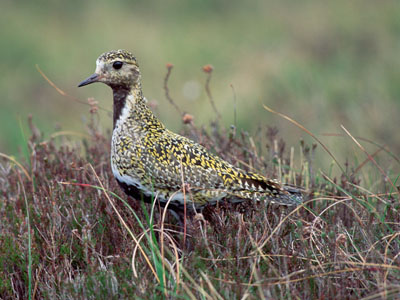A new study has revealed that UK’s blanket bog ecosystems, together with several rare avian species that depend on them for survival, are threatened by climate change impacts.
Blanket bogs or upland peats, not only supply drinking water to most of the UK, these wetland ecosystems are also important breeding and feeding grounds for iconic upland birds, including the golden plover, dunlin and red grouse.
According to the study, climate change poses two threats to peat bog ecosystems: Firstly, rising temperatures increases the rate of peat decomposition; and secondly, changes in rainfall patterns – notably increases in summer droughts – has a dramatic impact on the hydrology of these wetland systems.
The study, which was led by a team of ecologists from the University of York in collaboration with scientists from the British Trust for Ornithology, the University of Leeds, and Aberystwyth University, partly funded by the RSPB, highlights the importance of the lowly crane fly – or daddy longlegs – to the survival of peat bog bird species. The survival of many peatland bird species rests on this protein-rich food source, which parent birds depend on to feed their chicks. However, studies have shown that summer droughts, which scientists predict will increase in the future, will cause crane fly populations to decline significantly, which in turn will result in population declines of avian species that depend on them for survival.
The scientists warn that based on current climate change predictions, a computer generated model shows that declining crane fly populations could see red grouse numbers drop by 15%, golden plover by 30%, and dunlin populations could decline by as much as 50%, as a result of reduced prey availability.
The study’s finding, which were recently published in the scientific journal, Nature Communications, highlight the complexities of ecological inter-relationships — in this case between climate, peat-bog habitats, insects and birds. The researchers suggest that it may be prudent to implement large-scale restoration projects to degraded blanket bog habitats if we wish to save these internationally important avian populations, as well as secure our drinking water supplies.
Furthermore, peatlands play an important role in carbon storage, and any erosion, degradation or speeded up decomposition releases stored carbon into the atmosphere, acting as a carbon source rather than a carbon sink, resulting in a feedback loop that fuels further climate change.
“This is one of the first studies to follow this bug-to-bird link, down the food chain, between climate change and something happening to an entire ecosystem with relevance to people,” said Dr Andreas Heinemeyer from the Stockholm Environment Institute (SEI) based at the University of York, who developed the peatland model. “There is a very strong relationship between the moisture of the peat and the survival of the larvae of the crane fly during summer. July and August are peak times: if it is too dry, the larvae just desiccate and die and are then not available for the bird chicks the following year. “
According to Dr Heinemeyer, who currently leads a SEI research project to further study the impacts of climate change and management on UK blanket bog habitats, it’s not only rare bird species that are threatened by climate change impacts.
“We might be in for big change. Not just in connection with our birds, but our drinking water as well,” warns Heinemeyer. “If you end up being very dry as a blanket bog you store less water and your water quality seems to deteriorate as peat erodes and decomposes. So there seems to be a link, but it’s not an easy link. It is a very messy picture as vegetation and bugs are also involved and everything works together like a jigsaw puzzle,” he explains. “If you change a piece, you will change others around it.”
According to lead author, Dr Matthew Carroll, a Conservation Scientist with the RSPB: “Our work shows that climate change could harm some of our most iconic upland bird species. The birds rely on crane flies for food during the breeding season, and the crane flies rely on the cool, wet conditions in blanket bogs,” he explains. “Large-scale peatland restoration projects such as the Sustainable Catchment Management Project run by United Utilities and RSPB are crucial in helping to make our blanket bogs resilient to climate change.”
Journal Reference
Matthew J. Carroll, Andreas Heinemeyer, James W. Pearce-Higgins, Peter Dennis, Chris West, Joseph Holden, Zoe E. Wallage, Chris D. Thomas. Hydrologically driven ecosystem processes determine the distribution and persistence of ecosystem-specialist predators under climate change. Nature Communications, 2015; 6: 7851 DOI: 10.1038/ncomms8851




